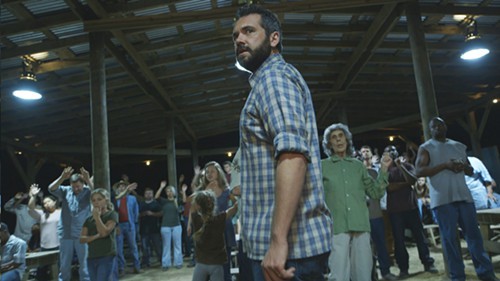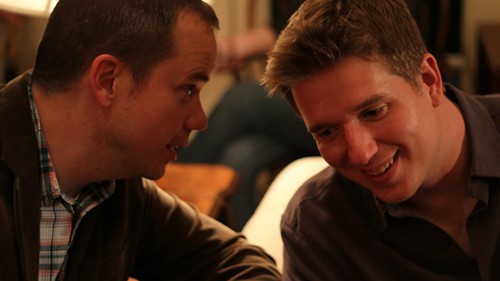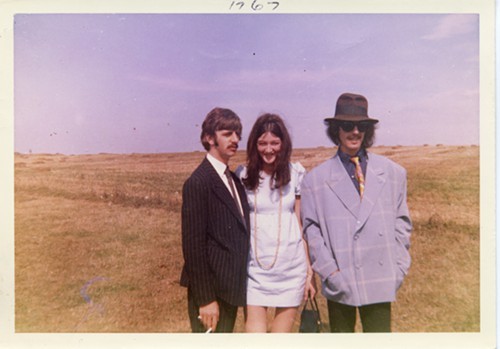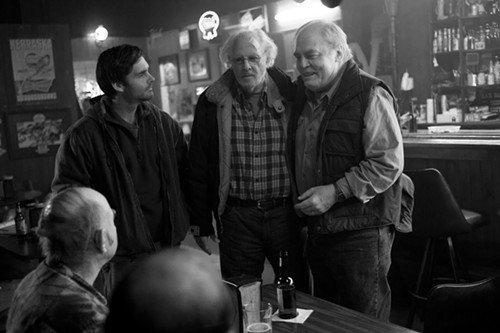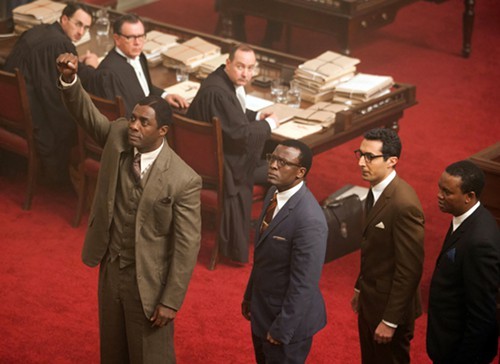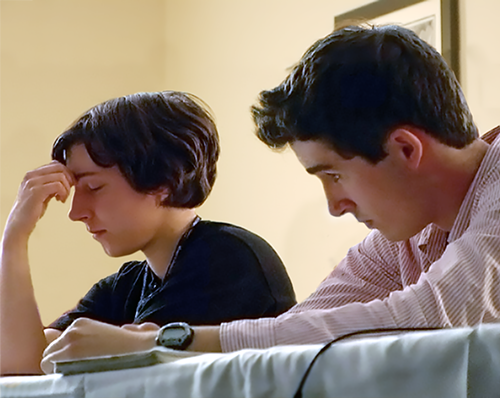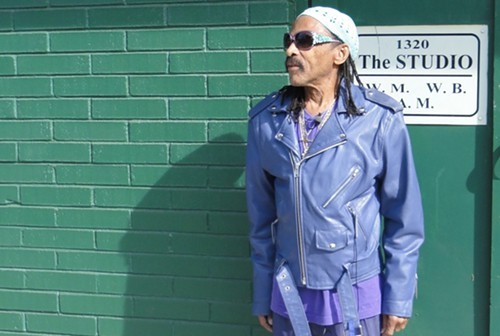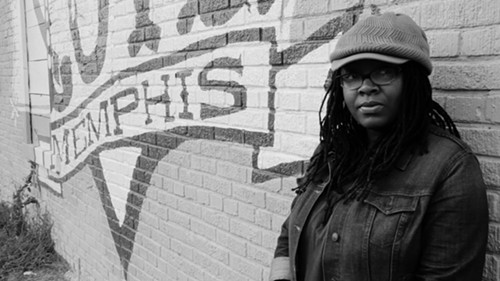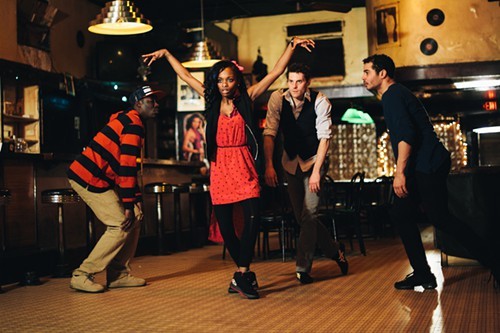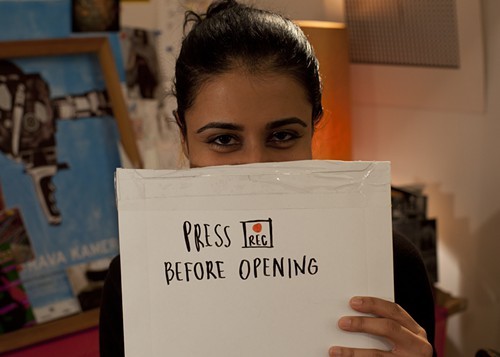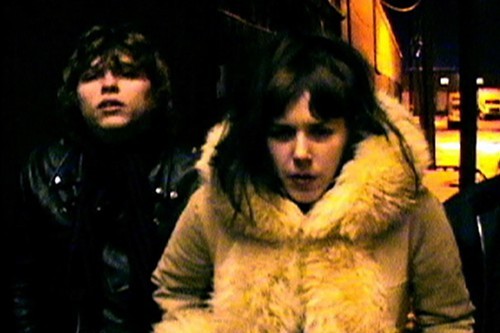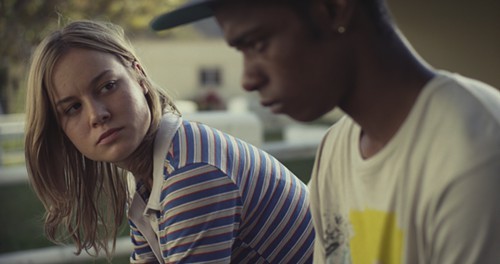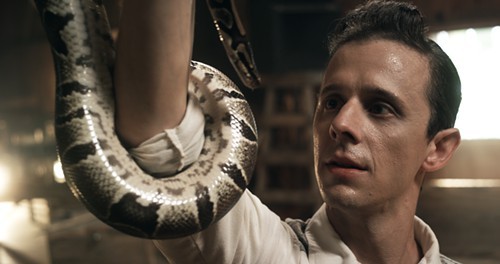These guys have been snubbing your dress code for 20 years now.
Month: November 2013
Indie Memphis: Sunday
Leave it all out on the playing field today, the last day of Indie Memphis. Sleep tomorrow.
Short Films #5, 12:15 p.m., Studio on the Square
I Wanted To Make a Movie About a Beautiful and Tragic Memphis (Laura Jean Hocking, 14 min.)
Sunday starts strong with this film by Memphis’ Laura Jean Hocking. The short contains images of the filmmaker’s past and of Memphis — empty lots, derelict buildings, and other things that used to be. Music by Jimi Inc. overlaps.
Hocking shares, “I am a romantic” and “Memphis is hard to love” and “Love is like sabotage and Memphis self-sabotages” and “Why would I love a place like this?” The answer, the narrative suggests, is tied up in Hocking’s emergence from her own difficult experiences.
It is beautiful. — Greg Akers
[jump]
Prom Song (Ben Siler, 4 min.)
Ben Siler’s stylish video of the Bake Sale tune “Prom Song” is about lateral movement and other consequences of a break-up. Siler’s camera relentlessly pans right for its female subjects and occasionally left for the males. The video tells a story of a break-up across numerous characters. It’s quite catchy. — Greg Akers
Vertigo Zoom (Ben Siler, 1 min.)
As described on Indie Memphis’ page (and, I suspect, written by filmmaker Ben Siler), Vertigo Zoom is “Pretentious fluff. Starring Gloria Dodds, Woody Woodward, Jessica Morgan, Drew Paslay, Savannah Bearden, Kris Steward, Bart Shannon.” The film presents a series of zooms, natch, with a series of actors (Bearden and a gun!) and clashing, looping music by Tropic of Cancer, from the sharing website intoinfinity.org. — Greg Akers
Please Wait Until the Tone (Laura Jean Hocking, 4 min.)
Another film by Laura Jean Hocking plays in this shorts program, Please Wait Until the Tone, shorter than I Wanted To Make a Movie About a Beautiful and Tragic Memphis but no less affecting. In it, fractal, wild images illustrate a series of answering machine (remember those?) and other telephone messages, reminiscent a little of the Replacements’ “Answering Machine.” If you need help if you need help if you need help… — Greg Akers
Furever (Amy Finkel, 80 min.), 12:30 p.m., Studio on the Square
Amy Finkel’s Furever makes the strongest, clearest case imaginable for taking your recently deceased pet to a taxidermist and having it stuffed — or pressing its cremains into a vinyl album, transforming it into wearable jewelry, mummifying it, or cloning it.
As a pet owner who immediately bristled every time Finkel used the term “pet parent,” I was eventually won over by her extended and updated appendix to Errol Morris’ great Gates of Heaven. Furever starts out as a This American Life-style geek show, but it gets bigger and better as it moves along.
Ultimately, it celebrates these dog lovers and cat fanciers because they have the courage to deal with the inevitability of death — an event which, of course, no American lifer thinks could ever happen to them. — Addison Engelking
Being Awesome (Allen C. Gardner, 77 min.), 12:30 p.m. The Circuit Playhouse, with filmmaker Q&A after the screening
This feature from Memphis director Allen C. Gardner stars Drew Smith as Lloyd, a divorced art teacher who’s lost his passion for life, and Gardner as Teddy, the lovable basketball jock who still thinks of high school as the glory days. At their high school reunion, the pair connect over their unhappiness with the way life turned out. Idealist Teddy suggests the two stop being depressed and just be awesome.
For a while, Lloyd has a bit of a harder time finding his artistic muse than Teddy, who seems to jump headfirst into something meaningful. Being Awesome’s emotional dialogue, the real meat of the film, sometimes is all too real — awkwardness and all. It’s a charm that leaves you to cheer on Teddy and Lloyd during this coming-of-middle-age story. — Alexandra Pusateri
Good Ol’ Freda (Ryan White, 86 min.), 12:45 p.m., Playhouse on the Square
Good Ol’ Freda, which derives its title from a soundtrack shout-out from one of the Fab Four heard early on in this film about the Beatles’ longtime Liverpool-based secretary, might just as well have been called Poor Ol’ Freda. Based on the life of the eponymous Freda Kelly, who as a 17-year-old habitué of the Cavern Club, latched onto the fledgling band and inherited its fan club duties from another fan, the film, directed by Ryan White, consists of recent interviews with the now 60-ish Kelly and others from the erstwhile Merseyside scene, interspersed with film-clips and stills of the group that became avatars of a transformed world-wide culture.
While evocative of the time and the Beatles’ gestation period, especially, the 86-minute film adds little that we don’t already know. We learn that Paul was “nice,” John was a creature of moods, George was “the quiet one,” and Ringo — whom Kelly refers to consistently as “Richie” — was a homebody type. Kelly describes a time when she was almost fired by an irate Brian Epstein, the Beatles’ manager, for inadvertently “wiping” he results of an interview session but was saved when Lennon laughed it off. “When a Beatle laughed, Eppy laughed,” she says. The moody Lennon himself once tried to sack her but, pressed by the other Beatles, relented and begged her back on bended knee.
Freda’s stretch with the Beatles ran all the way from Pete Best to Yoko Ono, though she sheds no light on the mysteries of either. She had a seat up front in the Magical Mystery Tour bus, but it was her sad duty, when the Beatles finally disbanded in the early ‘70s, to fold the official fan club zine, advising readers, “Please do not write again.” She married and bore a daughter, who is interviewed for the film, and a son, who, we learn in a mournful coda, would die.
In the end, older, sadder, and considerably heavier, she is still around, a working-class Liverpudlian living by her own resources. And “Richie” is there to pay her tribute as a “member of the family” in a touching cameo under the closing credits. — Jackson Baker
Nebraska (Alexander Payne, 110 min.), 3:15 p.m., Studio on the Square
Nebraska is helmed by Alexander Payne (The Descendants, Sideways, About Schmidt, Election). The father-and-son road comedy stars Bruce Dern (Best Actor at Cannes), Will Forte, and Bob Odenkirk, and it promises to flex its muscles at next year’s Academy Awards.
The screening is another coup for Indie Memphis, which in the past few years has added major “independent” Hollywood releases screening weeks or even months before they will be released on the big screen for everyone else. Nebraska is, in a way, an aspirational choice. Payne typically makes movies that could be made to some degree by anyone, regardless of budget, excepting for the A-list cast. Payne and his collaborators focus on the script, and it’s at least 60 percent of what make his films so good. He’s won two Oscars for screenplays. Granted, Payne has the luxury of not having to work a day job to fund his art. But, ostensibly, screenwriting accounts for a zero on a line-item budget. The film will follow the writing, Payne proves. — Greg Akers
Mandela: Long Walk to Freedom (Justin Chadwick, 152 min.), Playhouse on the Square
Mandela: A Long Walk to Freedom is Idris Elba’s vehicle to stardom for those who aren’t already smitten by his work in The Wire, Luther, The Office, or this year’s Pacific Rim (“Today, we are canceling the apocalypse!”).
This time, Elba plays the South African civil rights leader and is joined by Naomie Harris as Winnie Mandela. The buzz is strong for an Oscar nomination for Elba. — Greg Akers
Bible Quiz (Nicole Teeny, 76 min.), 5:15 p.m., The Circuit Playhouse, with Q&As with director Teeny and subject Mikayla Irie after the screening
Think typical Bible Drill on steroids, throw in some family issues, budding faith, and first loves and you have the feature documentary film Bible Quiz. It follows 17-year-old Mikayla Irle as she faces the struggles and self-doubt that go along with conquering adolescence. As an escape from the love she doesn’t feel she receives at home, she turns to her church family and its “bible quiz program” in which kids memorize scripture and compete against other churches.
Aside from the religious benefits of memorizing scripture and the fun aspect of the high stakes competitions, Mikayla has another incentive — spend time with her team’s captain (and the object of her crush), JP O’Connor, the hot shot quizzer who was named third in the nation the year prior.
The journey from the Northwestern District competition to Regional Finals and then the ultimate challenge, the National Bible Quiz Championship, is full of heated competition, tension of wanting the approval of your first love, and tremendous self discovery.
Some play for the trophy, and some play for the friendships, but all will walk away changed. — Anna Cox
Awards Show, 8 p.m., Playhouse on the Square and Encore Screenings
Indie Memphis’ victory lap will come this evening with the awards show honoring the best of the fest. Be there to give another round of applause for all concerned. Also, the evening will feature four encore screenings of the the hottest tickets at the festival. If you didn’t get in to see them the first go-round — or if you can’t stand the idea of not seeing them again — here’s your chance. — Greg Akers
For the full Indie Memphis lineup, go to the schedule here.
“12 Years a Slave” Haunts
Greg Akers says director Steve McQueen’s 12 Years a Slave is astounding and haunting.
Rusted Root Plays Newby’s
Pittsburgh hippie rockers Rusted Root play Newby’s Sunday. Joe Boone has a video.
Duwayne Burnside knows about guitar solos:
A Grifters Reunion Saturday
In conjunction with the Indie Memphis Film Fest, the legendary Grifters are performing Saturday night. Details on the reunion here.
Griz Top Pistons, 111-108
The Grizzlies won their home opener Friday night, but it wasn’t easy, as Kevin Lipe reports.
Dia a Los Muertos at the Brooks
Chris Davis reports on a Day of the Dead Fiesta at the Brooks Saturday.

- Larry Kuzniewski
- Griz Coach Dave Joerger got the first win of his career tonight against the Pistons.
Back to the Grind
It wasn’t pretty, but then, what ever is with these Memphis Grizzlies? When is it ever easy, and when does it ever look good when it happens? The Grizzlies got their first win of the young season tonight in their first home game, and they did it in typical Grizzlies fashion: they had to grind out a win even though nothing was going their way.
First things first: the Detroit Pistons are much better than they were last year. Andre Drummond and Greg Monroe are a brutal post duo to face off against (sound familiar?) and the addition of Josh Smith at the small forward spot in the place of our mutual friend Tayshaun Prince (not to mention swapping Brandon Jennings for Brandon Knight at the post, although Jennings was injured and out of action tonight) has made this a much better team than they were last year. Kentavious Caldwell-Pope (who I’ll refer to as KCP from here on out to avoid having to type that again) is a rookie guard out of Georgia with a lot of promise, and along with Rodney Stuckey the two of them gave the Grizzlies’ guards a great deal of trouble tonight off the bench.
A lot of things went wrong for the Grizzlies tonight against the Pistons. The first, and most obvious thing was the turnovers. I mean, 20 of them. Uncharacteristically, five of them were on Mike Conley, who seemed to be a little lackadaisical with his passing tonight. Zach Randolph accounted for another 4. It seemed like every other trip down the court, one of those two guys got the ball swatted out of his hands. Detroit is a much-improved defensive team this year, but they’re not, well, the Grizzlies, and taking care of the ball has to be a bigger concern for the Griz going forward.
[jump]
Another thing that was concerning to me tonight was the ability of the Pistons’ guards to get into the paint at will. Rodney Stuckey and Will Bynum seemed to be able to drive to the basket every single time they wanted to tonight, and the Grizzlies’ big men weren’t rotating properly to cut the drives off in time. I’m not sure whether the Griz are scheming a little differently on defense or whether they’re just doing more ball-watching than usual on defense, but whatever it is, the bigs can’t play as deep as they’re playing and expect to be able to keep opposing guards out of the paint. It’s just not going to work. I haven’t seen a shot chart yet, but it felt like Detroit was able to generate a large number of attempts near the basket, and with Monroe and Drummond both down low to clean up, it was no wonder the Grizzlies had so much trouble getting stops when they needed them.
Speaking of cleaning up: the Grizzlies only had 6 offensive rebounds all night. At halftime, they had 2, and one of those was on Zach Randolph’s last-second putback of a Mike Conley miss. A Memphis Grizzlies team only having 6 ORebs in a game that went longer than regulation is probably an outlier, sure, but that doesn’t make it okay. If that’s a trend that’s going to continue, it’s eventually going to start costing them basketball games.
If you hadn’t read the first paragraph and didn’t know how the game ended, you’d probably think I was describing all of the reasons the Grizzlies lost, right? It felt that way a lot of the night: like the Griz were going to lose because they were outexecuted and because they turned the ball over too many times. It was a back and forth game, with nine lead changes, the Pistons’ biggest lead being 7 and the Grizzlies’ being 10, but there were times when it felt like the Grizzlies’ sloppy play and inability to hang on to the ball were going to cost them the game.
But somewhere around the four minute mark or so, the Grizzlies started getting stops. Marc Gasol got to the line, and then with two minutes left Mike Miller hit a three to bring the Griz within 2 of the Pistons. The whole building held its breath while the shot arced toward the basket and exploded when it went in. I guess it’s a little early in the season for Gap Band, but it probably would’ve been appropriate. From there on out, the Grizzlies began to assert their control over the game and seemed to reconnect with their inner Grindfather, getting stops (and lucking out on a Chauncey Billups missed gamewinner) and riding Marc Gasol to the tie.
Overtime flew by and the Pistons never seriously challenged for the lead once the Grizzlies grabbed it, and the Grizzlies won 111-108 (it would’ve been 111-105 if not for a wide open Will Bynum buzzer beater from 33 feet).
Overall, hard to argue with the win. The Grizzlies still don’t look comfortable in the offense, and the play hasn’t tightened up yet. They appear to still be overthinking everything, never quite sure who to pass to or where to be. When plays break down guys start improvising, and that never seems to go well. It’s going to be a while before this group of guys—especially the new additions to the roster—start to feel completely comfortable on the floor together, and that’s fine. As Dave Joerger said in the postgame presser, the Grizzlies’ biggest talent is that every single guy on the roster plays hard no matter what, and it’s that professionalism (and, yes, grind-ness) that’s going to carry them through some rough patches that other teams might not make it through—like tonight. I’d sure like it if they were able to look good doing it, though. It’d make these things a lot less stressful.
Looking Ahead
Tomorrow night the Grizzlies take on the Mavericks in Dallas in the first SEGABABA (Second Game of a Back to Back) of the season. It remains to be seen exactly how this Mavericks team is going to gel. The Mavericks are on a SEGABABA too, having lost 105-113 to the Rockets in Houston tonight while the Grizzlies were handling the Pistons.
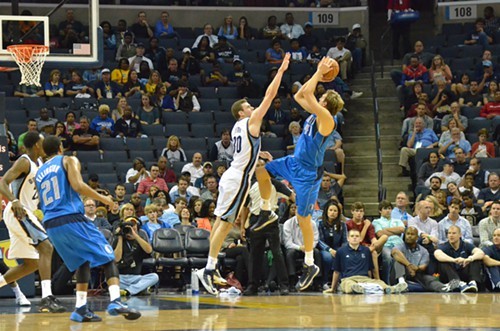
- Larry Kuzniewski
- Here’s hoping we see some more Leuer-on-Dirk action against the Mavs Saturday.
I’d like to see Mike Miller in street clothes for the Dallas game, since he played 32 minutes in tonight’s game. It might not hurt to keep the recovering Tayshaun Prince to 20 or fewer minutes again tomorrow night too. Beyond that, what happens is anybody’s guess. This early in the year, it’s unlikely that either team is currently in the same configuration they’ll be in at the end of the year.
Next week is a busy one for the Grizzlies, with three games—all at home, mercifully—against the Celtics (which, you know, they should be terrible this year, but look at the 2-0 Philadelphia 76ers), the New Orleans Pelicans (who are improved this year as well with the additions of Jrue Holiday and Memphis Tiger Tyreke Evans), and the Golden State Warriors with their white-hot shooting backcourt of Stephen Curry and Klay Thompson. It’s going to be an eventful week of basketball for the Grizzlies, but no matter what the outcome of tomorrow night’s Dallas game, if they can handle business next week and win at least two, I think they’ll be in great shape to tackle the rest of what looks to be a tough month of November.
Indie Memphis: Saturday
One Today (Lara Johnson, 6 min.), 10:45 a.m., Playhouse on the Square, screens before Orange Mound, Tennessee
Lara Johnson directs this short that features the reading of Richard Blanco’s poem “One Today,” which was the 2013 inaugural poem for President Barack Obama. The narration is provided by Zach Pless, and the accompanying visuals are of scenes that document workdays and nights in Memphis. — Greg Akers
Orange Mound Tennessee: America’s Community (Emmanuel Amido, 85 min.), 10:45 a.m., Playhouse on the Square, with Q&A with Amido after the screening
Fans of local history will appreciate the documentary about a Memphis neighborhood, Orange Mound, Tennessee: America’s Community. Filmmaker Emmanuel Amido captures the testimonies of past and present residents of Orange Mound regarding the struggles it’s endured, its many successes, and the unprecedented events that took place there.
Orange Mound, Tennessee: America’s Community begins with an a cappella performance of “My Soul’s Been Anchored” by the Melrose High School choir. This is followed by a visual history lesson on the neighborhood.
The area was once a plantation owned by John Deaderick in the 1820s. In the mid-1890s, real estate developer Elzey Eugene Meacham purchased the land and divided it into small, narrow lots and marketed them exclusively to African Americans.
The area became the first African-American neighborhood in the United States to also be built by African Americans; residents constructed shotgun-style houses on the lots that were sold to them by Meacham. These homes would go on to house generations of families. And many of these families built and owned their own properties, churches, and schools in Orange Mound.
Other facts, such as how the neighborhood earned the moniker Orange Mound, are highlighted in the documentary. (The area boasted countless Osage orange trees during its early days.)
Grammy Award-winning jazz saxophonist Kirk Whalum, National Civil Rights Museum president Beverly Robertson, and University of Memphis professor Charles Williams are among those who make appearances in Orange Mound, Tennessee.
Amido makes sure to not only focus on the positive attributes of Orange Mound but also the less fortunate characteristics as well. The documentary explores how the neighborhood went from being one of Memphis’ most thriving areas economically to one of its most impoverished and crime-ridden. This is largely attributed to many of its residents migrating to other areas of the city during the civil rights era, which left a void in the sense of community that Orange Mound once enjoyed.
A solid effort to say the least, Amido does an excellent job of capturing the meat and potatoes of what the documentary form can entail and the message that’s most significant: Orange Mound is an area with a rich history, unique culture, and strong sense of community. — Louis Goggans
[jump]
What I Love About Concrete (Katherine Dohan and Alanna Stewart, 97 min.), 1:30 p.m., The Circuit Playhouse, with filmmaker Q&A after the screening
A young girl gets out of a stranger’s bed in a house where she’s never been before. She’s covered in downy white feathers. She pulls back the covers and finds a dead bird.
Ah, the perils of being a teenager! Which is exactly the premise of What I Love About Concrete, the debut feature from local filmmakers Katherine Dohan and Alanna Stewart. The lovingly made, sweet bildungsroman finds Molly (Morgan Rose Stewart), a junior at Black Swanson High School (fictional, alas), who is struggling to make sense of her body’s changes and her burgeoning sexuality. The film swaps the horror-repulsion of adolescence in Carrie for the magical unrealism of seeing but not understanding what it means to transform into an adult.
What I Love About Concrete does a lot with a little budget, including some inspired human-sized bird costumes. The film also features hilarious supporting turns from local talent including Markus Seaberry, Bill Baker, Kimberly Baker, Sara Chiego, and The Commercial Appeal‘s John Beifuss (swoon!). — Greg Akers
“Secret Screening” (120 min.), 1:45 p.m., Studio on the Square, with filmmaker conversation after the screening
I can’t say what the subject of the secret screening on Saturday will be. But, based on what I know, I will be there sight unseen, and if you are in any way interested in history related to Memphis, civil rights, and/or black power, consider taking the plunge with me. The audience will be the first to see a cut of a new documentary, produced by Craig Brewer, and to participate in a discussion about what you have seen. — Greg Akers
Sketches of Soulsville: Royal Studio (Ondine Geary and Sarah Ledbetter, 6 min.), 3:30 p.m., Playhouse on the Square, screens before I Am Soul
This lovely film is of a like mind with another short playing later in the day, John Kirkscey’s Bookin’. Sketches of Soulsville captures a dance piece staged at Willie Mitchell’s Royal Studio. A young woman stands before a microphone, smiles as if she can hear music inside, and then we see a dance piece that mixes jookin’ and modern dance; it’s like the woman’s inner monologue of rhythm and movement. Ondine Geary is credited as creator and co-director, with Sarah Ledbetter as the other co-director. Together with Bookin’, Sketches of Soulsville presents a compelling case that black and classical dance forms are finding new, exciting interpretations in Memphis. — Greg Akers
Mabon “Teenie” Hodges: A Portrait of a Memphis Soul Original (Susanna Vapnek, 35 min.), 3:30 p.m., Playhouse on the Square, screens before I Am Soul
Guitarist and songwriter “Teenie” Hodges takes center stage in this documentary that traces him from birth at home in 1945 and a childhood in a large family in Germantown — Teenie is one of three sets of twins in the sibling set — all the way up to present. In between is the rub.
Hodges’ dad was a musician who played in the Germantown Blue Dots. The musical family encouraged Teenie, and Willie Mitchell took him under his wing when Teenie was a teen. (Susanna Vapnek’s film includes interview footage of Mitchell from before his 2010 death, which makes it all the more worth catching.) Teenie joined the Hi Records house band and went on the road, including playing local clubs that were segregated, such as the Plantation Inn and the Manhattan Club. Hodges made some great friends, including David Porter and Isaac Hayes, with whom he co-wrote songs such as “I Take What I Want.”
Hodges recounts when he and Mitchell “discovered” Al Green in Midland, Texas. “I wanted to cry tears, he was so good,” Hodges says of Green. Hodges partnered with Green, leading to many of the great songs in the Green catalogue, such as “Love and Happiness” and “Take Me to the River.” About the latter, which was used in a hugely popular novelty item from the’90s, “Big Mouth Billy Bass made me more money than any song I ever recorded. What a world! What a world.”
A few other memorable moments in the film include Hodges indicating the pond where he was baptized, which inspired “Take Me to the River”; recurring scenes of Hodges driving around town singing along in his gravelly voice to some of the greats he co-wrote; and a brief reunion with Al Green at his Full Gospel Tabernacle Church — an encounter that says a whole lot about their relationship. — Greg Akers
I Am Soul (Johnathan Isom, 61 min.), 3:30 p.m., Playhouse on the Square, with live music by Tonya Dyson before the screening and a Q&A with Isom after the screening
I Am Soul poses the question “What is soul music?” then attempts to answer that question by spotlighting one Memphis soul artist — Tonya Dyson, a singer/songwriter from Covington — introducing us to her family, church, and other aspects of her life that have influenced her music, and culminating with Dyson’s first Beale Street gig at B.B. King’s Blues Club. I Am Soul is a touching story of a talented, homegrown artist navigating her way through a city with a renowned musical legacy.
Alternating between Dyson’s story and the story of Memphis’ rich music history, I Am Soul shows that it takes more than just talent to make it in Memphis. In the film, Dyson calls Memphis a “music mecca” and says, “If you’re dedicated, and you’re focused, and you’re smart about how you do things, you can get a lot done in Memphis.” Her perseverance through life’s difficulties supports that assertion and shows that the artist is really what makes the music when it comes to soul. — Hannah Anderson
Short Films #3 (95 min.), 3:30 p.m., Studio on the Square
Historic Hospitality (Geoffrey Shrewsbury, 6 min.)
Bessie Smith died there. Ike Turner wrote “Rocket 88” there. Muddy Waters lived there. So, yeah, the Riverside Hotel in Clarksdale, Mississippi, is a pretty historic place. Geoffrey Shrewsbury’s film Historic Hospitality takes a look at the inn, with interviews that include the since-deceased owner Frank “Rat” Ratliff and local historians such as Shelley Ritter and Roger Stolle. — Greg Akers
From Cotton Fields to Movie Premieres (Geoffrey Shrewsbury, 11 min.)
Geoffrey Shrewsbury has another similarly themed film at this year’s Indie Memphis, From Cotton Fields to the Silver Screen, about Ruleville, Mississippi’s Luster Bayless, who went from a sharecropper’s son in the Delta to the owner of one of the largest film costume houses in the nation, United American Costumes.
Bayless went to L.A. after a relative got settled out there, and he talked his way into a job at a costume company. He worked his way onto the set, and caught the eye of John Wayne, who selected him to costuming on all of his films. The two became great friends. “John Wayne wore cotton,” Bayless says.
Bayless’ entrepreneurial spirit led him to build a great costume house that featured clothing from every period in American history, from the 1700s to the 1970s and beyond. His catchphrase is to give actors their look from “head to toe.” Bayless collected items from across the country. One method was to trade two new cowboy hats for one old cowboy hat, well-worn by actual ranchers.
Today, there’s a museum in Ruleville, where you can see some of Bayless’ great pieces, from Wayne gear from True Grit to Jamie Foxx’s get-up in Django Unchained and Tommy Lee Jones’ from Lincoln.
He even costumed Robert Duvall’s Gus McCrae from Lonesome Dove. A fact which made my heart leap from my mouth. — Greg Akers
Bookin’ (John Kirkscey, 21 min.)
Bookin’ is one of the best films at Indie Memphis this year. Along with Sketches of Soulsville by Ondine Geary and Sarah Ledbetter, Bookin’ presents a compelling case that black and classical dance forms are finding new, exciting interpretations in Memphis.
John Kirkscey directs and Jonathan Kirkscey scores the film — don’t get me started on how it’d just be easier if they were the same person.
The concept of the film is to combine two performers of classic ballet and two performers of jookin’ and hip-hop dance forms, and to see what happens. The film shows the rehearsals and final performance of the piece, which is all filmed at Earnestine & Hazel’s, so, yeah, this is the most Memphis movie ever.
A good portion of the doc is spent getting everyone up to speed on what jookin’ is — how it started with Gangsta Walking in Memphis, with music by Young Jai to complement the material. It also shows scenes of ballet at Playhouse on the Square, sometimes with two dancers superimposed as if performing a duet.
The four dancers — LaShonte Anderson and Jonathan Gaston are the jookers, Rafael Ferreras and Dylan G- Bowley are the ballet dancers — meet for the first time on camera and get to know each other by dancing, playing off each other impromptu. Jookin’ is about staying on the beat, so they have to break from that impulse to find middle ground.
Anderson coins “bookin'” as the cross between ballet and jookin’. She also critiques her own dance, saying “Do more like a swan than a tiger.” Yep, total crush.
The last 5 minutes or so is the performance, with music by the Kirkscey that does music, a mix of cello and beats that’s as entrancing as the dancers. it’s a highlight of the festival. — Greg Akers
Hank and Asha (James E. Duff, 73 min.), 4:15 p.m., Studio on the Square, with a Q&A with producer, editor, and writer Julia Morrison after the screening
A movie whose two leads are almost always staring back at you, Hank and Asha revitalizes some well-worn romantic tropes through its ingenious formal constraints. The film is comprised of a series of video messages between Asha (Mahira Kakkar), a female film school student in Prague, and Hank (Andrew Pastides), a documentary filmmaker whose recent work has inspired Asha to contact him.
Will their highly controlled and composed romantic communiqués hinder their hesitant, brainy courtship? They certainly make an unlikely if winning pair: Asha is warm, generous and open, while Hank is cool, solitary and guarded. In a nicely worked-out twist, Hank’s family history and manic romantic intensity actually generate more problems than Asha’s secret. But the very best thing about James E. Duff and Julia Morrison’s movie is that it ends exactly the way it should. — Addison Engelking
Meanwhile in Memphis: The Sound of a Revolution (Nan Hackman and Robert Allen Parker, 120 min.), 6 p.m., The Circuit Playhouse, with a Q&A with Hackman and Parker after the screening
Would you like to see Tav Falco take a circular saw to his guitar while onstage with Mudboy & the Neutrons? Or tug on the narrative thread connecting Furry Lewis to contemporary Memphis rap and indie rock? Or would you just like to hear an amazingly powerful, sometimes terrifyingly aggressive collage of sounds that prove without question that the music didn’t leave Memphis when the music industry did?
Fans of modern Memphis music, especially those who were drawn to Chris McCoy’s Antenna documentary, a hit at the 2012 Indie Memphis film festival, will want to check out Meanwhile in Memphis: The Sound of a Revolution, an exhaustive look at the Bluff City’s underground music scene in the ’70s, ’80s, and ’90s, directed by Mid-South musician Robert Allen Parker and videographer Nan Hackman. The film features engaging and insightful interviews with Falco, Jim Dickinson, Sid Selvidge, DJ Spanish Fly, Monsieur Jeffrey Evans, DJ Squeeky, members of the Oblivians, the Grifters, and the Klitz, and numerous other scene-shaping performers. While Antenna captured the essence of Memphis’ punk and DIY culture as it coalesced in the ’80s and ’90s, Meanwhile in Memphis looks far beyond the iconic Midtown venue to consider the music itself, the musicians, and the not always evident connectedness between generations and genres, which makes the scene seem like a sprawling, occasionally dysfunctional family.
Meanwhile in Memphis introduces viewers to a city in decay: Stax is closed and American Recording is boarded up. But there’s life in the ruins. Weeds spring up in abandoned lots, and the musicians who came of age in Memphis in the ensuing decades were every bit as hearty as wild grass.
It’s the first feature film for both Parker and Hackman and was shot over a period of seven years. Like the subject at hand, what’s missing in terms of polish is more than made up for in smarts and substance.
“I really wanted these musicians to tell their story,” says Parker who, when not working his day job selling records at the Memphis Music store on Beale, plays guitar in three area bands.
The film tells the story of two distinct scenes with common roots, evolving alongside one another and sometimes converging in surprising ways: the predominantly white Midtown/downtown rock scene as defined by artists ranging from Alex Chilton to Alicja Trout and the buck-and-crunk scene that blew up in North Memphis and Orange Mound.
Fascinating interviews capture the essence of contemporary artists like Harlan T. Bobo and the North Mississippi Allstars, with supporting commentary from Boo Mitchell of Royal Studios, Shangri-La founder Sherman Willmott, and music writer Robert Gordon.
Oblivians/Reigning Sound frontman Greg Cartwright defines both the film and its cast when he attempts to describe the feeling you get when you realize you’re part of a legacy and connected to something much bigger than you could have ever imagined. Meanwhile in Memphis isn’t about famous people. It ignores revolutionary figures like Elvis Presley and Otis Redding and, in doing so, makes a strong case that the revolution continues. — Chris Davis
Short Term 12 (Destin Daniel Cretton, 96 min.), 6:15 p.m., Playhouse on the Square, with a Q&A with Cretton, actors Kaitlyn Dever and Keith Stanfield, and reps from Youth Villages after the screening
No matter how many self-deprecating anecdotes they share — or how many self-inflicted physical scars they show — the youthful but wary optimists of Destin Daniel Cretton’s Short Term 12 are never sure how much they’ve actually helped the deeply damaged teens and tweens in their care. That’s because the kids they work with have been hurt so deeply and so often that they automatically distrust anyone who peddles any form of “I’m your buddy” BS.
But Grace (Brie Larson) and her colleagues at the titular foster-care facility keep trying anyway. Cretton follows Grace as she tries to separate the chaos of her work life from some unexpected developments involving her co-worker and live-in boyfriend Mason (John Gallagher Jr. in a sweetly lower-case performance).
Mason, who tells two stories that serve to open and close the film, is not as passionate and reckless as Grace. But he’s still very good at his job. The long scene where he provides the beat while a young man (Keith Stanfield) shares his anxiety about leaving through some brutally personal hip-hop lyrics is one of the film’s many emotionally complex high points.
Grace remains the focus of Short Term 12, though. Larson’s layered, unpredictable acting here should garner plenty of accolades. However, Kaitlyn Dever, who plays Jayden, a cagey, raccoon-eyed girl determined not to play nice, is also superb. The relationship that develops between the two women further articulates Cretton’s belief in the power and necessity of unconditional love. Which is not to say that there’s no darkness before the light: The long scene that unfolds on Jayden’s birthday, for example, was one of several that brought me to tears.
Tender, tragic, and ultimately overflowing with compassion, Short Term 12 is more than a highlight of Indie Memphis. It’s one of the year’s best films. — Addison Engelking
Brothers Hypnotic (Reuben Atlas, 87 min.), 6:30 p.m., Studio on the Square
The documentary Brothers Hypnotic follows seven brothers, sons of jazz trumpet legend Phil Cohran, who comprise the Hypnotic Brass Ensemble as they try to reconcile their father’s rigid anti-establishment values with their desire to expand their musical influence.
The brothers write their own music, combining the jazz band training they received from their father with the sound and feel of funk and hip-hop. But what is even more interesting than the brothers’ musical style is the story of their musical journey, beginning with their intriguing upbringing in Chicago where they were raised by two mothers and their patriarchal father. All three parents instilled musical discipline into the boys with early-morning practice sessions.
The brothers prove that although it’s difficult, it is possible to break through the music industry’s glass ceiling without surrendering your independence and selling out to a well-known record label. After turning down an offer from Atlantic Records, the brothers embark on a self-funded, seven-country tour, which results in some surprising opportunities for them in the UK.
This is an inspiring story about talented artists who refuse to surrender their musical independence in order to make it big. — Hannah Anderson
H4 (Paul Quinn, 114 min.), 9 p.m., Playhouse on the Square, with Q&As with actor/producer Harry Lennix and screenwriter Ayanna Thompson
Read Chris Davis’ Flyer piece on H4 here.
Meanwhile in Memphis After-Party/Indie Memphis Music Showcase, 9 p.m., The Warehouse
Read J.D. Reager’s Flyer piece on the show here.
Holy Ghost People (Mitchell Altieri, 103 min.), The Circuit Playhouse, with Q&As with Altieri, writer/actor Joe Egender, writer/producer Kevin Artigue, and producer Don Lewis
Holy Ghost People is a gritty and rattlesnake-tense redemption story that ultimately questions the redeemers, and “What if the truth ain’t straight?”
Charlotte, a young bartender, enlists the help of Wayne, an alcoholic former Marine, to help her find her sister. When the two arrive at Sugar Mountain, Wayne learns he’s been led to the Church of One Accord.
The snake-handling, belt-whipping campsite church is the headquarters for a ragged congregation of addicts and outcasts looking for forgiveness with the help of Brother Billy, the charismatic and subtly sinister minister.
Charlotte and Wayne infiltrate the camp looking for clues that will lead them to the missing sister. They are led, instead, deeper into the brooding heart of Brother Billy’s sect.
Holy Ghost People is wonderfully shot on the realistic and beautiful backdrop of Middle Tennessee’s Upper Cumblerand Plateau, though the setting and well-cast actors have to overcome ZOMG church rites for the film’s thrills and drama. — Toby Sells
Computer Chess (Andrew Bujalski, 92 min.), 9:30 p.m. Studio on the Square
One of the more anticipated films of the festival, Computer Chess is the latest from director Andrew Bujalski, who is often credited with birthing the Mumblecore genre with the 2002 feature Funny Ha Ha. Computer Chess, interestingly, defies any easy label. It’s neither drama nor comedy nor sci-fi nor romance nor thriller, and at some point, it’s all those things.
The movie is set at a computer chess tournament over a long weekend in the early ’80s, and the tone is captured smartly by the use of the video film. Some moviegoers will find watching Computer Chess to be chore, while others will delight in the little clues and plentiful quirks sprinkled throughout the film. Those on the fence should definitely stick it out for the last 20 minutes. — Susan Ellis
For the complete schedule, go to Indie Memphis’ Saturday page here.
